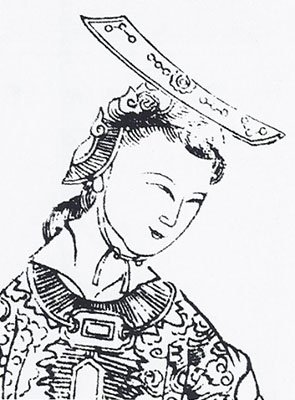Let's start by acknowledging that it is rare to find successful women leaders in world history: Theodora in Byzantium, Hatsheput in Egypt, Catherine the Great in Russia, Elizabeth I in England, Wu in China. Unlike Theodora in Constantinople, Wu Zetian (624-705) came from wealth. But was she a brutal usurper of power or an intelligent, reform minded woman? In either case, reaching the pinnacle of power and then wielding that power was an impressive achievement in the traditional, male-dominated society of the Tang Dynasty (618-907 CE) in China.
It's a pretty complicated story of that rise to power, and it is not a pretty one. Let me over simplify. Born into wealth, she became concubine of the emperor T* when she was fourteen. She became one of the emperor's favorites and was promoted to work as his secretary. Prince L*, the emperor's son, also found Wu attractive and started an affair with her despite the fact that he was already married. Well, emperor T* died, and Wu and all the concubines were sent off to exile so a new set of concubines could be brought in for the new emperor. But, as luck would have it, the new emperor was prince L* (now known as emperor G*) who brought Wu back as concubine #1. Emperor G* wife, lady W*, had no children, and his former concubine #1, lady X*, had a son and daughters. In addition, emperor G* had already picked his heir to the throne, LZ*, who was the son of the uncle of lady W*.
Wu gave birth to two sons (son #1 LH and son #2 LX). The question became, How did they fit into the imperial family? In 654, Wu's newborn daughter died in her crib, evidently of strangulation. Who strangled her? Wu claimed that it was lady W*. (Later Chinese historians claimed that it was Wu who strangled her own child.) To make the claim even more believable, Wu accused lady W* (and the mother of lady W*) and lady X* of witchcraft. All of these women and their relatives were removed and exiled. (Lady W* and lady X* would later both perish in exile.) Wu was now empress, and the real power behind the throne of emperor G*. Emperor G* had some sort of eye disease, and that made Wu even more powerful since she controlled information given to him. She even organized military campaigns against Korea that allowed China to control Korea.
Wait, we are not yet done with the bizarre family events. People had been disappearing from court for years as Wu sought to consolidate her power behind the scenes. By 674 CE, Wu claimed to be "Empress of Heaven," and with emperor G* (Emperor of Heaven), they were ruling as divine monarchs until the emperor's death in 683 CE. Son #1 became the new emperor with Wu as empress regent, but dissatisfied with him, Wu removed him and placed son #2 (or was it son #3)--doesn't really matter because you know what was going to happen--on the throne. In 690, the son abdicated, and Wu became sole ruler, as empress Wu Zetian, of a new Zhou dynasty.
So, technically Wu reigned as emperor/empress until she abdicated in 704 and died a year later. Were those good or bad years? Well, there were changes.
- the establishment of a secret police force and a far-ranging spy system
- reform of the structure of the government to reduce spending and increase efficiency
- introduction of new characters for the Chinese writing system
- creation of a suggestion box for people to report grievances, strange omens, problematic court decision, incompetent officials, etc.
- expansion of the education system
- agricultural reform
- military exams for commanders to show competency
In later years, Wu became somewhat paranoid (That's never a good personality trait for a ruler!). The purges, exiles, deaths flowed one after another in a blurred stream. Then Wu ensnared herself in a scandalous love affair with not one but two young brothers Z*, decades younger than her. That probably wouldn't have been much of a problem if a male emperor had trysts with women decades younger, but for a seventy-year old woman, that was a problem. There were even tales of drugs? The Z* brothers ended badly, and Wu abdicated in favor of her exiled son #1. She died in 705. It had certainly been a remarkable life.
Empress Wu was buried in a tomb alongside emperor G*. A blank stele marks the tomb, never inscribed with her deeds as was customary. Her importance? She has been the only female ruler in thousands of years of Chinese history. That says something about Chinese society. Her expansion of the educational system opened up a pathway to the government for a far wider range of competent people in China and ensured that governments in the future would have a ready source of talented bureaucrats.
![]()
Some recommended online resources
- Wikipedia
- Mike Dash, The Demonization of Empress Wu (Smithsonian Magazine)
- Britannica
- Ancient History Encyclopedia
- The Reign of Wu Zetian: From Concubine to Empress to… Emperor!
- Wu Zetian: China’s kick-ass female Emperor (BBC radio)
- For extra credit please suggest to your instructor a relevant website for this unit of the course. Send the title of the site, the URL and a brief explanation why you find the information interesting and applicable to the material being studied in this unit.
